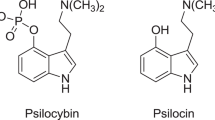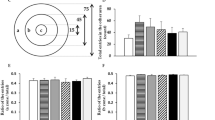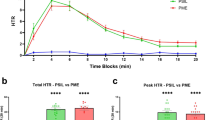Abstract
THE presence of alkaloids derived from lysergic acid in the seeds of the morning-glory varieties Ipomoea violacea (L.) and Rivea corymbosa (L.) Hall f. was discovered by Hofmann1 and confirmed by several workers2–5. Reports of alteration of mental state after ingestion of morning-glory seeds have been made to this Directorate and have also appeared in the public press. Osmond6 reported an abnormal mental state after ingestion of the seeds of Rivea corymbosa, but Kinross-Wright7 was not able to induce any such changes in eight subjects. Cohen8 reported that some individuals appear to have no reaction whatsoever while others may respond as to d-lysergic acid diethylamide (LSD). In this same communication, a case of suicide following a recrudescent psychic reaction to ingestion of morning-glory seeds was also reported.
This is a preview of subscription content, access via your institution
Access options
Subscribe to this journal
Receive 51 print issues and online access
$199.00 per year
only $3.90 per issue
Buy this article
- Purchase on Springer Link
- Instant access to full article PDF
Prices may be subject to local taxes which are calculated during checkout
Similar content being viewed by others
References
Hofmann, A., and Tscherter, H., Experientia, 16, 414 (1960). Hofmann, A., Planta, 9, 354 (1961).
Taber, W. A., Vining, L. C., and Heacock, R. A., Phytochemistry, 2, 65 (1963). Taber, W. A., Heacock, R. A., and Mahon, M. E., Phytochemistry, 2, 99 (1963).
Beyerman, H. C., van de Linde, A., and Henning, G. J., Chem. Weekblad., 59, 508 (1963).
Groger, D., Flora, 153, 373 (1963).
Genest, K., Proc. 13th Ann. Conf. Superintendents of Laboratories of the Food and Drug Directorate, Ottawa, Jan. 1964, p. 20.
Osmond, H., J. Mental Sci., 101, 526 (1955).
Kinross-Wright, V. J., Neuropsychopharmacology, 1, 453 (Elsevier Publishing Co., 1959).
Cohen, S., Amer. J. Psychiat., 120, 1024 (1964).
Hofmann, A., Bot. Mus. Leaflets, Harvard University, 20, No. 6, 194 (1963).
Solms, H., J. Clin. Exp. Psychopath., 17, 429 (1956).
Yui, T., and Takeo, T., Jap. J. Pharmacol., 7, 157 (1958).
Bliss, C. I., Ann. Appl. Biol., 22, 134, 307 (1935).
Author information
Authors and Affiliations
Rights and permissions
About this article
Cite this article
RICE, W., GENEST, K. Acute Toxicity of Extracts of Morning-glory Seeds in Mice. Nature 207, 302–303 (1965). https://doi.org/10.1038/207302b0
Issue Date:
DOI: https://doi.org/10.1038/207302b0
This article is cited by
Comments
By submitting a comment you agree to abide by our Terms and Community Guidelines. If you find something abusive or that does not comply with our terms or guidelines please flag it as inappropriate.



